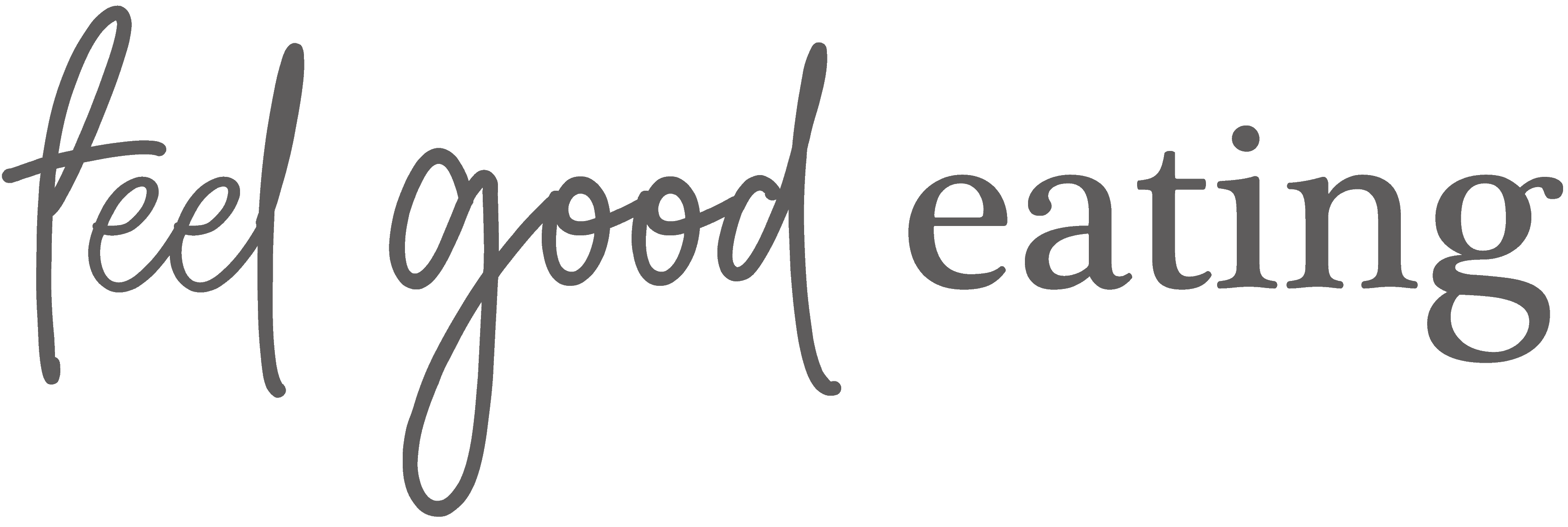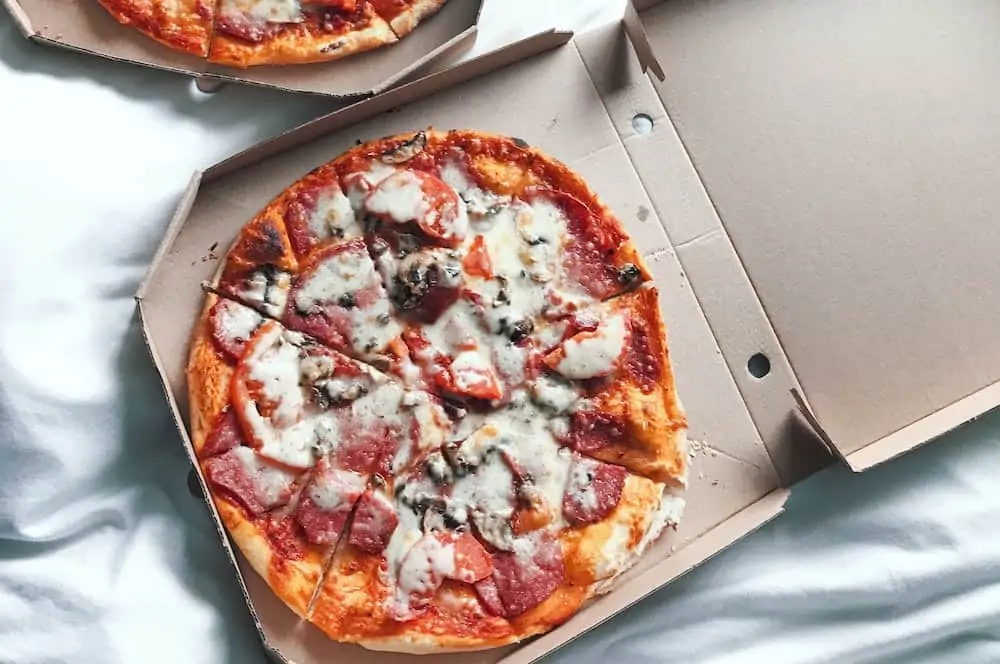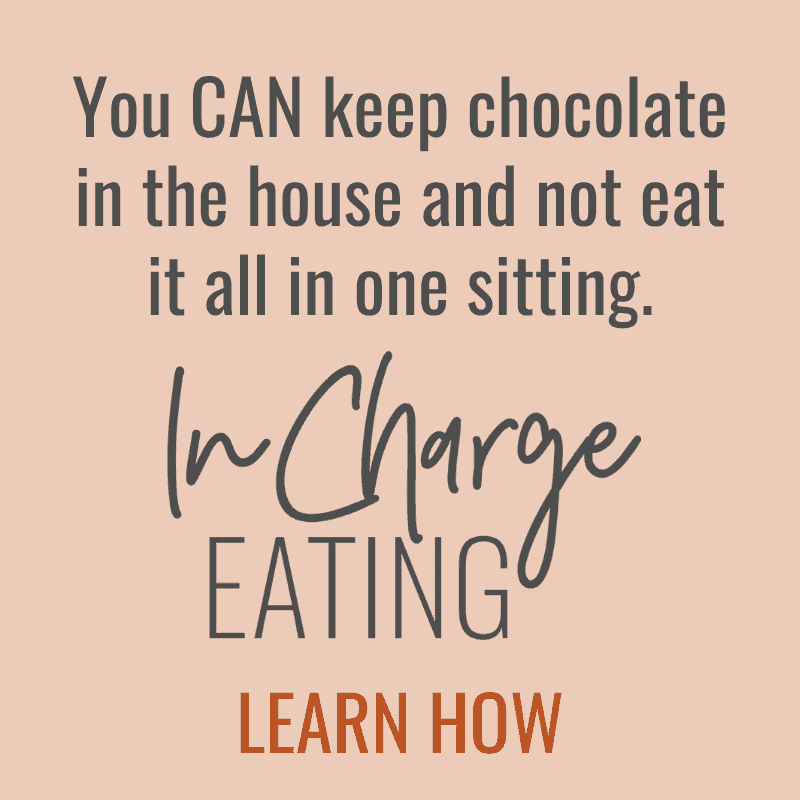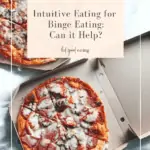With Intuitive Eating’s growing popularity, I receive lots of enquiries from people wanting to tackle their binge eating using it.
Given how awful people can feel after a binge, I can really appreciate them wanting to try all sorts of things to heal their relationship with food.
So, let’s explore whether Intuitive Eating is helpful for binge eating.
What is binge eating?
Binge eating is the name given to the experience of eating large amounts of food in a short period of time. People also describe feeling out of control while they are binge eating and will eat well beyond the point of comfortable fullness.
Read more about what is considered a binge here.
What is Intuitive Eating?
Intuitive Eating was developed in 1995 by dietitians Evelyn Tribole and Elyse Resch. In their workbook they say;
“Intuitive Eating is a dynamic mind-body integration of instinct, emotion, and rational thought. It is a personal process of honoring your health by paying attention to the messages of your body and meeting your physical and emotional needs. It is an inner journey of discovery that puts you front and centre; you are the expert of your own body.” (pg1)
Intuitive Eating is made up of 10 principles;
- Reject the Diet Mentality
- Honour Your Hunger
- Make Peace with Food
- Challenge the Food Police
- Discover the Satisfaction Factor
- Feel your Fullness
- Cope with your Emotions with Kindness
- Respect Your Body
- Movement – Feel the Difference
- Honour Your Health with Gentle Nutrition
While the book and workbook lay out the principles in a linear fashion; in practice, ‘progress’ or the pathway that people take is rarely linear. This is important to note as we consider how Intuitive Eating and healing binge eating work together.
Is Intuitive Eating helpful for binge eating?
This isn’t a yes or no question. Instead, I’ll say; “It depends.”
Yeah, I hear you groaning at me over there!
It depends because the causes of, or what sparks a binge, are often multi-faceted.
They include:
- Inconsistent food intake
- Going for long periods without eating
- Deprivation of certain foods or food groups (this can be both the physical restriction or the mental deprivation)
- Experiencing food insecurity (currently or in the past)
- Feeling tired
- Feeling stressed
- Experiencing emotions that feel too big, too much or too uncomfortable (or not feeling connected to emotions)
- History of trauma
- Dieting
- Body dissatisfaction
Some of those reasons may mean that jumping straight into Intuitive Eating – specifically, trying to do hunger and fullness work will make things worse, rather than better.
For example;
- If binges are occurring as a result of trauma, asking someone to connect with what they feel inside of their body and use it as information to guide starting and stopping eating, may feel incredibly difficult or cause them to feel re-traumatised.
- The restrict/binge cycle that is very common for people experiencing binge eating tends to disrupt hunger and fullness cues, making them unpredictable. So, starting Intuitive Eating with trying to listen to hunger and fullness will probably feel really frustrating.
- Skipping meals and snacks in the morning after a binge because there’s an absence of hunger cues and the strong presence of fullness cues will keep binges happening rather than getting respite from them.
- Only attempting Intuitive Eating with the intention of weight loss will turn it into another diet (that will fail).
What comes first then?
Shane Jeffrey’s RAVES framework offers a helpful pathway from binge eating to Intuitive Eating.
Phase 1 aims to reduce the frequency and intensity of binges by working on regularity and adequacy of eating. This is foundational work for addressing the biological drivers of binge eating.
And where there is a history of trauma, it might be more appropriate to start at Phase 0 with supporting the person to feel OK with the idea of nourishing their body. Somatic nutrition counselling can be particularly helpful here.
Phase 2 looks at dietary variety, eating socially and increasing willingness to be flexible and spontaneous with food and eating. This strengthens the foundations from Phase 1 and lays the groundwork for trusting food decisions, the body, and eating intuitively.
Phase 3 is where the classic hunger and fullness principles of intuitive Eating can ‘safely’ be incorporated.
Are there any Intuitive Eating principles you can start with?
This is really dependent on the individual and it is why working with a credentialled eating disorder clinician who is also very well versed in Intuitive Eating can help.
The principles of Intuitive Eating that complement Phases 1 and 2 are:
- Reject the Diet Mentality – especially to disentangle the intent to only use Intuitive Eating as a weight-loss tool for binge eating.
- Challenge the Food Police – to dismantle all of the rules and baggage attached to foods (e.g. ‘binge foods’ versus ‘allowed foods’).
- Discover the Satisfaction Factor – before hunger and fullness, connecting with how foods can satisfy can provide reassurance and relief for people who feel they are a ‘bottomless pit’ when it comes to binge eating. This principle can also help people to connect with things that provide satisfaction in addition to food.
- Cope with your Emotions with Kindness – this is an important part of exploring the emotional drivers of binge eating.
- Respect your Body – because there is never a ‘wrong’ time to work on being neutral rather than negative towards your here-and-now body.
Which principles work best later?
The principles of Intuitive Eating that are more helpful later are:
- Honour Your Hunger and Respect Your Fullness – hoping the reasons why these principles have to come later is clearer now, but head back up to the examples given to explain why jumping straight into hunger and fullness might make things worse.
- Honour Your Health With Gentle Nutrition – this principle is always left until last so that we don’t let a focus on nutrition distract or get in the way of coming home to our bodies.
- Make Peace with Food – When this principle is most appropriate to explore depends on the fear levels associated with binge foods.
- Movement – Feel The Difference – when this principle is most appropriate to explore depends on whether movement or exercise is being used as a way to compensate for a binge.
Of course, these are not hard and fast rules and the principles that feel comfortable to try on and experiment with may unfold in a completely different way for you. Intuitive Eating can certainly be a wonderful approach to move you towards a more peaceful relationship with food and your body if you have been experiencing binge eating. But you’ll likely need to do some ‘pre-work’ first that will really help to lay down a smoother pathway to becoming an Intuitive Eater.


 Hi! My name is Nina.
I’m a Certified Intuitive Eating Counsellor taking the ‘diet’ out of Dietitian. I am here to help you reject diet culture, tune into your body’s own inner wisdom about how to truly nourish yourself and ultimately feel good eating™
Hi! My name is Nina.
I’m a Certified Intuitive Eating Counsellor taking the ‘diet’ out of Dietitian. I am here to help you reject diet culture, tune into your body’s own inner wisdom about how to truly nourish yourself and ultimately feel good eating™ 
